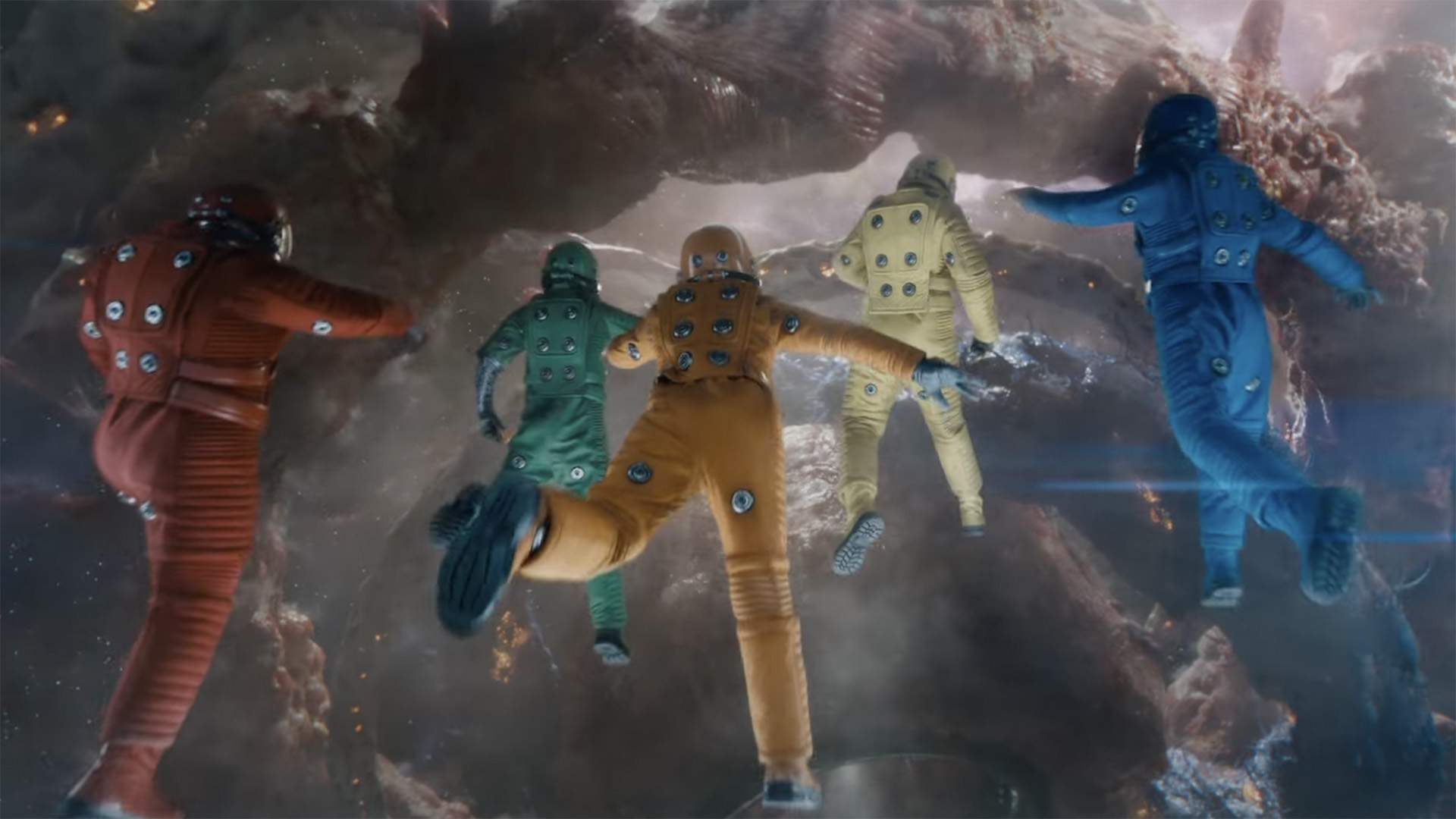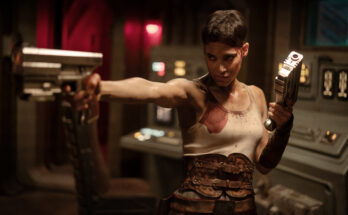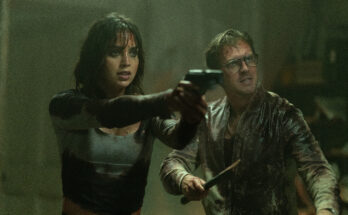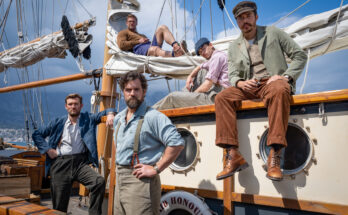Want to hear more from the actors and creators of your favorite shows and films? Subscribe to The Cinema Spot on YouTube for all of our upcoming interviews!
Managing editor & film and television critic with a Bachelor's of Arts in English Literature with a Writing Minor from the University of Guam. Currently in graduate school completing a Master's in English Literature.
Over the course of about nine years, James Gunn’s heroic Guardians of the Galaxy have had five feature films, a brief appearance in a Thor-centric project, and a Christmas special to develop as a cosmic group of heroic nobodies. Somewhere within nearly eight months of that time, Gunn had been fired as the filmmaker of their final Marvel Cinematic Universe entry, Guardians of the Galaxy Volume 3.
This delayed the film’s production and pushed its release date until Gunn was eventually reinstated as the writer and the director. In the interim, the result of these delays allowed time for Gunn to be given a role in the DC Extended Universe as the filmmaker behind 2021’s The Suicide Squad, along with its spin-off streaming television series, Peacemaker. Alas, the critically acclaimed Guardians of the Galaxy finally meet their conclusion via the second installment in the MCU’s fifth phase. Undoubtedly, Volume 3 was way worth the wait.
Minor spoilers to follow.
Discussion
Gunn ups the ante one last time for the final installment of the Guardians trilogy. Coming off of the first film and its 2017 sequel, the writer-director delivers the final story that has all the levity, tears, and astonishing creativity as the first two entries. Yet, this time around, Volume 3 has in store for itself a longer runtime. While that may cause divisive discourse amongst fans, viewers, and casual moviegoers alike, the entirety of the narrative brings a satisfactory collection of cinematic elements, along with some huge themes to gain out of it.
To begin, Gunn allows the comedy to be dispersed naturally within the two-and-a-half hours. The interaction between his characters feels so genuine and meaningful that you can already feel how much the Guardians have bonded as a family. Drax the Destroyer (Dave Bautista) still does not know any better, and it is no facade; that has always been his temperament. Whether he is offering Peter Quill/ Star-Lord (Chris Pratt) philosophical advice or being rude as a guest in someone’s home, the man never changes, and that is not a bad thing either.
The levity mixes well with the overwhelming darkness of the overall narrative. Quill displays his maturity with brilliance, now showing his care for the galaxy and his close loved ones as well. He has a moment with his friends where they are floating atop some kind of epidermal space planet and they talk about different colored buttons—I could not stop laughing at how intentionally illogical the dialogue can get. More so, I love that Gunn provided Rocket Raccoon (voiced by Bradley Cooper) with a background, that he just is not some animal living in the middle of the cosmos. The character serves a larger purpose, but more on that in a bit.
Cinema At Its Best
Of course, the screenplay does get difficult to deal with, albeit at seldom times. Quill’s dialogue with some other characters regarding a “magic cliff” (watch Infinity War Parts I & II) felt like exposition. To be honest, that could have been condensed a little more. Rocket had a moment in the final act where it looked like he would suffer from the same fate as his old friends, but Gunn allowed this to play out unpredictably. I saw this as an excellent narrative decision, although the execution could have been done a tad differently. In addition to that, the dialogue in this film should be one reason to watch it. Lylla (voiced by Linda Cardellini), an otter, has a memorable line: “There are the hands that made us, and there are the hands that guide the hands”.
Henry Braham’s cinematography is neat as well. For example, Drax throws a punch at Adam Warlock (Will Poulter), and we see the camera spin as the latter is shoved into the ground. The one-take shot in the final act definitely helps solidify itself as some of the best scenes in the Multiverse Saga thus far. Stephane Ceretti, Susan Pickett et al’s visual effects work enhances the look of these shots, from the zooming in of the team in their new spacecraft, the Bowie to Quill floating through open space to a certain fate. Even the mutated animal henchmen of the High Evolutionary (Chukwudi Iwuji) are creepy to look at; and Groot (voiced by Vin Diesel) has evolved profoundly since the last time we have seen him.
Mickle, Scott, and Hook’s set pieces are just as memorable, topping anything we may have seen in the prior two entries. Orgoscorps, Counter-Earth, and the High Evolutionary’s ship have so much for characters to explore, and when it comes to the action sequences, it gets quite spacious for bodies to be thrown around.
The Soundtrack
Admittedly, Volume 2’s soundtrack underwhelmed me, and I held the first film’s tracklist as my favorite. However, that was until I watched Volume 3, which tops many of what I listened to religiously in the prior two installments. There is a moment somewhere in the latter half of the film where the Guardians theme takes on an epic tone. When you hear it and see the scene in which it appears, you just might agree.
It would be an understatement to say that Gunn and music supervisor Dave Jordan’s selections were brilliant. Spacehog’s “In the Meantime” and the Beastie Boys’ “No Sleep Till Brooklyn” are just a couple of titles that are perfectly paired with scenes in which they respectively appear.
If you think that the soundtrack would only consist of music from before Quill took his decades-long trip to space, then you are mistaken. The final scene in the main narrative has a heartwarming song by Florence + the Machine, and it just parallels well with what happens in the trilogy’s first installment. It is almost as if to tell die-hard fans that it was not necessarily a dance-off that saved the lives of millions, but a dance-along. That was a good message to send to those who have watched these characters since 2014.
Bear Witness to This Biblical Stint
Given Gunn’s Catholic milieu, the rhetorical Biblical elements of the narrative felt evident. Most obvious in the film is the concern for animal life and other life forms. This need to save everyone and not just one group points to the story of Noah’s Ark in the Book of Genesis. The film’s subplot implies that, although the Guardians’ story is meeting an end, in another light it is just the beginning. The moral about the animals is an inspiring highlight to make here because when it comes to life, it is not just about humankind or extraterrestrials. Gunn accentuates the reminder that animals are beyond pet status.
It is now clear that the Guardians of the Galaxy—in this first trilogy—deal with men who have god complexes. What I noted about the first entry is that the primary antagonist obsessed with the Power Infinity Stone. He decided to use it for his own personal gain and lay ruin to the cosmos. This is an instance of omnipotence, or the state or quality of being all-powerful. In the second entry, Quill’s father reveals that his son and his other kinfolk/ seed hold his essence, all spread out through the cosmos. This is an example of omnipresence, an all-presence, or ubiquity.
Volume 3 exhibits the third component that renders an individual, or rather, entity, a god—omniscience, or the state or quality of being all-knowing. The screenplay accomplishes this feat intelligently through the disparity between Rocket and the High Evolutionary, and this is where the narrative about the need for a proper co-existence amongst all species comes into play.
Transhumanism and Enlightenment
In my previous reviews at The Cinema Spot, I wrote about transhumanism and posthumanism, or enlightenment versus enlivenment. Indian professor Pramod K. Nayar sees transhumanism as follows.
[Transhumanism] treats technology as a means of ‘adding’ to already existing human qualities … seeing the limitations of the human body (biology) as something that might be transcended through technology … that current human nature is improvable throught the use of applied science and other rational methods…
[Transhumanism] relies on human rationality as a key marker of ‘personhood’ and individual identity, and sees the body as limiting the scope of the mind … continues to believe in the Enlightenment ideals of the human/animal divide [and] treats humanity as a species separate and self-contained.
Pramod K. Nayar, ‘Posthumanism’ (2014) pages 16-17
Likewise, German biologist Andreas Weber sees the Enlightenment as the following.
[H]umans can change [the world] (because we can understand it); and that we not only have the ability but also the right to change it in order to improve the human condition. [The Enlightenment is] a way of thinking and being that has to an incredible degree improved the living conditions for at least a part of humanity.
Andreas Weber, ‘Enlivenment: toward a poetics for the Anthropocene’ (2019) page 26
For Weber, the Enlightenment is an anthropocentric (that is, centered on humankind) study of thought that is very much a colonizer mindset that involves “sovereignty over the cosmos” and “result[s] in our taking reality hostage. We colonize it by believing in the concept of a treatable, repairable, controllable world”. These enlightened, transhuman characteristics match that of the High Evolutionary, even judging from the trailers alone. His motives and means are not enough and thus does not prove himself to be someone who truly aims to transform life in the cosmos. He is just a colonizer, a usurper.
Posthumanism and Enlivenment
Gunn writes the High Evolutionary in such a good manner that is all talk and no show. His apparent intentions are to create a “perfect species” to then establish a “perfect society [where lifeforms are] programmed to be peaceful”. In a way, he implies that what he seeks to do is create a utopian society through what he calls “The New World”. In an early part of the film, Rocket and his friends believe they are being transferred over, like Moses and the Israelites’ trek to the Promised Land. However, the High Evolutionary is akin to Pharaoh in that he enslaves individuals into making him his little empire. Rocket, especially in his role as a Guardian, represents the enlivened posthuman.
According to Nayar, posthumanism:
[C]alls attention to the ways in which the machine and the organic body and the human and other life forms are now more or less seamlessly articulated, mutually dependent and co-evolving … offers a more inclusive and therefore ethical understanding of life. [Posthumanism] sees human subjectivity as an assemblage, co-evolving with machines and
Nayar, ‘Posthumanism’, pages 19-22
animals. It also calls for a more inclusive definition of life, and a greater moral—ethical response, and responsibility, to non-human life forms in the age of species blurring and species mixing [and] has a definite politics in that it interrogates the hierarchic ordering – and subsequently exploitation and even eradication – of life forms.
Additionally, Weber sees enlivenment as follows.
[The Enlivenment] consider[s] the world not from the abstract perspective of a functional object, but from the lived perspective of meaningful first-person experience.
It offers an invitation to participate in life. [However, d]eath is inevitable and even necessary as the precondition for the individual’s striving to stay intact and to grow [and as] an integral component of life.
Weber, ‘Enlivenment’, pages 25-26, 50, and 84
Anti-Utopia: Space The Sky Is the Limit
Utopia is not necessarily an answer to posthumanism and the enlivenment, as Weber further states:
As the expression of continuous transformational processes and ongoing self-creation, ecological systems—with humankind in their midst—are sliding from catastrophe to catastrophe.
Life processes make for incomplete creations, because creation cannot be anything but flawed. To strive for perfection rather than connection is to position oneself outside creation. It is an attempt to control aliveness, an attempt that inevitably produces death. The truly utopian power we retain in this situation is nothing we have to fight for, because it is already there as a choice offered to us.
[We must accept that] to remain the same, we may need constant, often painful transformation. It means, finally, that feeling enlivened does not necessarily mean feeling
Weber, ‘Enlivenment’, pages 161, 163, and 165
good.
Rocket, even Groot, and by extension, the rest of the Guardians, are beyond human in that they face or experience death in one way or another. Posthumanism and enlivenment are the goal of these protectors of the cosmos but at the cost of death along the way. In the first film, we watched this happen with Groot, then with Yondu Udonta (Michael Rooker) in the second installment. What I love about Rocket this time around, through Gunn and Marvel Comics, is how anthropomorphic his character traits are. He is a character who has encountered tragedy in his lifetime, but he never gives up his life’s mission.
James Gunn did such a fine job at wrapping up his Guardians trilogy in such a way that allows us to start a new chapter. By closing these characters’ individual and collective stories, we are not seeing the end to their tales but a refresh and restart in order to pave the way for what we may expect next. Volume 3 is as perfect as it should be, and as much as you might believe otherwise, that can prevent you from understanding the larger message of what is being provided.
The Crew Behind Guardians of the Galaxy Vol. 3
Victoria Alonso, Louis D’Esposito, Simon Hatt, Nikolas Korda, and Sara Smith are the executive producers of the film. Kevin Feige serves as the producer, while David J. Grant and Lars P. Winther are co-producers.
John Murphy returns to score the music of the soundtrack. Dave Jordan serves as the music supervisor. David Acord and Cheryl Nardi are the supervising sound editors.
Henry Braham returns as the cinematographer. Greg D’Auria and Fred Raskin are the editors. Tatiana S. Riegel is the film editor.
Sarah Halley Finn returns as the casting director for the film. Rachel Nadler and Molly Doyle are the casting associates. Chase Paris and Tara Feldstein Bennett are the Atlanta casting directors.
Heidi Moneymaker is the stunt coordinator. Wayne Dalglish is the co-stunt coordinator. Loyd Bateman is the fight coordinator, while Micah Karns is the fight choreographer.
Chris Romrell serves as the stunt double for Peter Quill/ Star-Lord. Alicia Vela-Bailey is the Gamora stunt double. Rob de Groot and Gary Peebles are the Drax stunt doubles. Aurelia Agel is the Nebula stunt double. Ellette Craddock is the Mantis stunt double. Kyle McLean is the Groot stunt double.
Aesthetics
Beth Mickle is the production designer. David E. Scott and Alan Hook are the supervising art directors. Rosemary Brandenburg is the set decorator.
Judianna Makovsky is the costume designer for the film. Michelle Moon and Shanna Knecht are the assistant costume designers.
Cassie Russek is the hair department head, while Alexei Dmitriew is the makeup department head.
Stephane Ceretti is the visual effects supervisor. Susan Pickett is the VFX producer. Andy Park is the visual development supervisor. Daryl Sawchuk is an additional VFX supervisor.
Kosta Saric, Bob Drwila, Tyler Whitman, Zeke Morales, and Dominick Rolandelli serve as the VFX editors.
The Cast of Guardians of the Galaxy Vol. 3
Chris Pratt (The Super Mario Bros. Movie) portrays Peter Quill/ Star-Lord, the eventually legendary human hero and captain of the Guardians. Zoe Saldaña portrays Gamora, Quill’s former love interest.
Bradley Cooper voices Rocket Raccoon, the team’s most intelligent member. Vin Diesel (F9) voices Groot.
Dave Bautista (Army of the Dead) portrays Drax the Destroyer. Pom Klementieff portrays Mantis, Quill’s sister. Karen Gillan portrays Nebula, Gamora’s sister and the team’s former enemy.
Sean Gunn portrays both Kraglin and a young Rocket. Maria Bakalova (Borat Subsequent Moviefilm) voices Cosmo the Spacedog.
Antagonists
Chukwudi Iwuji portrays the High Evolutionary.
Will Poulter portrays Adam Warlock. Elizabeth Debicki portrays Ayesha, the Golden High Priestess of the Sovereign society.
Nathan Fillion plays Master Karja. Jennifer Holland plays Administrator Kwol.
Jonathan Fritschi plays a “carrot head guard”. Max Bickelhaup plays “kitty Orgosentry”, Brandon Morales, plays a dancing guard”, and Renae Moneymaker plays a violent Orgosentry”.
Judy Greer voices War Pig. Nico Santos plays Recorder Theel, while Miriam Shor portrays Recorder Vim. Dane DiLiegro plays an unsavory octopus.
Secondary Characters
Noa Raskin voices a baby Rocket, while Lylla voices Lylla, Rocket’s closest friend and love interest. Asim Chaudhry voices Teefs. Mikaela Hoover voices Floor.
Daniela Melchior (The Suicide Squad, Fast X) portrays Ura. Kai Zen portrays Phyla. James Gunn appears as Lamb-Shank.
Christopher Fairbank reprises his Guardians of the Galaxy role as Broker. Michael Rooker appears as the late Yondu Udonta.
Gregg Henry reprises his role as Jason Quill, Peter Quill’s grandfather. Karen Abercrombie appears as Jason Quill’s wife and Peter Quill’s grandmother. Seth Green appears as the voice of Howard the Duck.

Performances and Character Developments
Quill’s leadership capabilities are showcased so well in this installment. In the first film, the character exhibited himself as reckless and independent from others. Throughout his stay in the MCU, Quill gradually proved his worth as a hero in his own way; and by Volume 3, although he still shows individuality, we see just how much he might be in need of those around him. Pratt, more or less, continues to solidify his role as Star-Lord, and it is evident here. Quill is still a child at heart, much like Peter Pan who has been residing and adventuring in Never Land for too long.
Gamora’s courage is a trait that I admired throughout the film. The character’s rejection of Peter is Saldaña’s best performance here, and it might just be one of my favorite non-thrilling scenes to watch happen. While it is unfortunate to see the actor let go of the character, I cannot help but appreciate the sense of finality she tries to give to Gamora. This is not the same Gamora that we have seen in the previous two installments, nor the one who was present in the Infinity War films. She represents the death of one Gamora and the uncanny return of an other.
Underappreciated Characters
Groot’s transformation is one that does not garner sufficient responses. In Volume 3, the character shows that he is getting larger than life again, sprouting his wings, and branching out but still sticking to his roots. His role feels more diluted than I would like to believe, but he does have his moments. Groot’s better scenes appear to be in the latter half, where he exchanges optimistic energy with those around him. Diesel does have a surprise at the end through a line of dialogue, and it is one that suggests more is to be expected from him in the future.
Kraglin and Cosmo’s dynamic is sweet, yet not as present as others in the film. Sean Gunn makes Kraglin a character who is more protagonistic than a supporting role. Bakalova is lovely as the voice of Cosmo and adds to the theme of animals as a species to care for. Hopefully, there is more to see from both characters in the future.
Highlights
Nebula’s pathos is a quality that deserves more credit. I made nothing of it on my first watch. However, on my second viewing, the character showcases a change in herself, like others on the team. I am not too keen on how much her physique resembles that of the Winter Soldier, yet I appreciate how indestructible she literally is and can be.
Rocket Raccoon’s heart is everything, and all of the scenes in which he appears makes the film so excellent. I could not tear up during my second viewing of the final act when he was nearing the light. There is not enough to be said, but this is a character that people will empathize with for years to come. In the case of Disney live-action animals not having emotion, Rocket is a great exception. Cooper’s voice acting of the character alone is deserving of awards nominations.
Mantis’s kindness and Drax’s stupidity is a weird, yet fitting combination. While their time together in the Infinity Saga and in the Christmas special was still early in their dynamic, Klementieff and Bautista surely possess the chemistry it takes to evoke some poignance, tears, and laughter out of the audience.
More or Less Antagonistic
Adam Warlock’s innocence corroborates the choice to have Poulter in the role. Having seen the actor in films such as We’re the Millers and Midsommar, there is no doubt at what he can do. Like some of the other Guardians, he is still a child in a manner of speaking. It is unfortunate that we did not see him in the later parts of the Infinity Saga, but it would be curious to see what he has in store for this cinematic universe’s second major storyline.
The High Evolutionary’s cruelty is harsh, and while he is more present in the latter half of the film, when Iwuji does appear, he is menacing. There could be more to solidify him as a full-on villain, but the actor tries to make up for it through his mannerisms, somewhat ominous actions, and poetic dialogue with other characters.
Final Thoughts on Guardians of the Galaxy Vol. 3
Guardians of the Galaxy Volume 3 is one of the better films that the Multiverse Saga has given fans and viewers thus far. It reminds us that “[e]veryone deserves a second chance” but not without the self-destruction and transformation of characters through development and experiences. While it may seem like the end for Gunn as a storyteller in the Marvel Cinematic Universe, the characters he brought to the light live on. Volume 3 also has a perfect mixture of music and a wide array if appealing visuals that is going to be hard to not look and listen.
James Gunn’s Guardians of the Galaxy Vol. 3 is now playing in theaters!
For more action, adventure, adaptation, and comedy-related news and reviews visit and follow The Cinema Spot on Facebook, Twitter, and Instagram!
Managing editor & film and television critic with a Bachelor's of Arts in English Literature with a Writing Minor from the University of Guam. Currently in graduate school completing a Master's in English Literature.





5 Comments on “‘Guardians Of The Galaxy Vol. 3’ Non-Spoiler Review – A Heartfelt, Yet Tear-Jerking Finale To The Cosmos’ Most Loved”